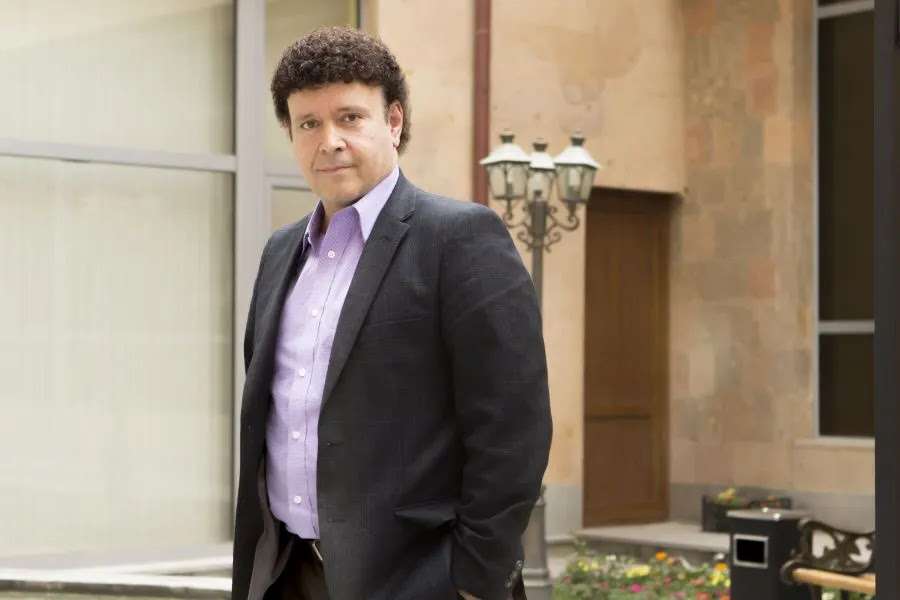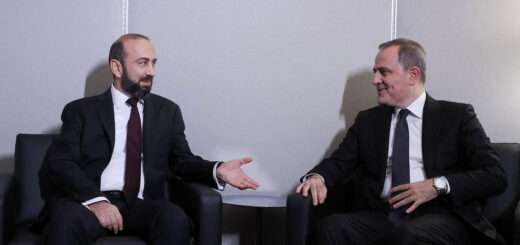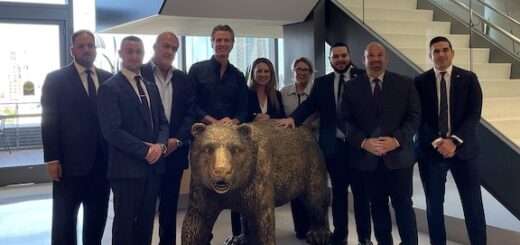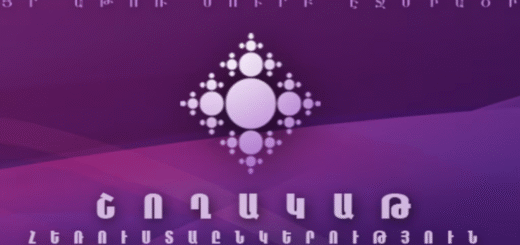“A united Armenia would be unstoppable” says Daniel Decker, musician and Armenian by choice

Milena BaghdasaryanArmenian WeeklyComposer, singer and lyricist Daniel DeckerThough composer, singer and lyricist Daniel Decker is of Puerto Rican descent and was raised in New York, he has embraced an Armenian soul through his music.
Decker first collaborated with renowned Armenian composer Ara Gevorgyan on “Noah’s Prayer,” originally titled “Moush.” The piece, with Gevorgyan’s mesmerizing music and Decker’s biblical lyrics, premiered in 2002 at Sardarapat, Armenia, as part of the Armenian Independence Day celebrations. The event was attended by ambassadors from several countries and broadcast live on Armenian television and via satellite to over 30 countries.
Their second collaboration, “Adana,” tells the story of the Armenian Genocide with depth, compassion and solace. “I wrote ‘Adana’ not only to draw international attention to a tragedy, but as a source of healing to the Armenian people,” Decker told the Weekly. The song was later translated into 20 languages and recorded by musicians worldwide.
In addition to his musical contributions, Decker has worked with relief organizations to aid underprivileged children and elderly people in Armenia’s most impacted regions.
During his most recent visit to Armenia, we spoke with Decker about his journey to becoming ABC (Armenian by choice) and creating music deeply rooted in Armenian culture.
Milena Baghdasaryan (M.B.): When did you first encounter Armenia? Was there a particular moment, place or person that made you fall in love with the country?
Daniel Decker (D.D.): Exactly 25 years ago, in the year 2000. Since I didn’t speak Armenian, I didn’t understand the words unless the song was translated for me. In the beginning, it was the music itself that affected me.
The first thing that made an impression was hearing Ara Gevorgyan’s music, especially his melody “Moush.” It had a profound effect on me. After hearing the recording, I contacted him and proposed a collaboration. I didn’t know much about Armenia at the time, but through that collaboration, I learned a great deal and, over time, fell in love with Armenia and its people.
M.B.: Is there a particular singer or song that inspires your music?
D.D.: I draw influences from many different places — jazz, classical, pop, Armenian music, world music. However, Armenian music had the most profound effect because it was so unique compared to what I was exposed to, growing up in the U.S.
M.B.: How did your friendship and collaboration with Ara Gevorgyan come about?
D.D.: Ara is a very dear friend and one of the first Armenians I became friends with. We’ve had a strong friendship for 20 years and have collaborated on many songs, including “Moush,” “Adana,” “Remember” and “Love Each Other.” We always look for opportunities to continue our collaboration, even though our schedules make it challenging.
M.B.: What drives your compositions, and do you have a favorite place to compose — or do ideas come to you anywhere?
D.D.: Usually, it’s just a spark of an idea. I don’t set out to write about a specific topic; a melody or musical concept comes to me, and from there, it develops. When I start, I don’t know what it’s going to be yet.
I mainly compose in my studio at home in the U.S., but inspiration can come from anywhere — visiting places, driving or listening to something else. If an idea comes to me, I record it on my phone so I don’t forget, then develop it in the studio.
M.B.: Do you attribute your creative inspiration to something beyond yourself?
D.D.: I give all the credit to God, our Creator. He gives us our talents, and everything I do is dedicated to Him. I thank Him for enabling me to compose music and for using me in this way.
M.B.: How did you acquire Armenian citizenship? Did you encounter any challenges?
D.D.: The Armenian passport was given to me by the government in 2015, during the 100th anniversary of the Armenian Genocide, as recognition for my activities supporting Armenian culture and awareness of the genocide. It was a gift, not something I applied for. Unfortunately, it expired after 10 years, and my attempts to renew it were unsuccessful. I would love to be a citizen of Armenia again.
D.D.: The Armenian community was very supportive and proud.
The passport symbolized strong support for Armenia. Becoming a citizen is the ultimate display of commitment. I have faced negative reactions from Azeris and Turks for 20 years, but I stand by my beliefs and remain true to myself.
M.B.: Do you have any upcoming projects related to Armenia?
D.D.: I’m always finding new opportunities for cooperation in Armenia. Initially, it was my songs with Ara Gevorgyan, then singing in Armenian and recording my Armenian CD, “Armenian by Choice,” in 2010. I’ve also learned about Armenian folk music and worked with musicians who played national instruments. My great love now is Armenian folk music, which I believe holds the essence of Armenian character and history.
Daniel Decker’s Armenian CD, “Armenian by Choice,” released in 2010
M.B.: Do you see yourself as an ambassador of Armenia to the U.S., or vice versa?D.D.: Years ago, a friend called me a cultural ambassador for Armenia. I’m proud if people see me that way because I can introduce Armenia to non-Armenians. Since I wasn’t born Armenian, people are often curious about my love for Armenia, which gives me a unique opportunity to share its importance.
M.B.: Are you sure you’re not Armenian?
D.D.: When the Ark came to rest on Ararat, Noah and his family were the first Armenians.
We’re all descended from them, so in a way, everyone is Armenian — it’s just that not everyone realizes it yet.
M.B.: How do you view Armenia’s neighboring countries and their attitudes toward the country? Do you worry about any negative reactions to your opinions?
D.D.: Turkey and Azerbaijan do not love Armenia; on the contrary, they hate Armenia and aim to discredit its history, make illegal territorial claims and appropriate Armenian culture. For example, they have falsely claimed Armenian instruments and music as their own, but the truth is that Armenia’s history predates theirs by thousands of years.
Unfortunately, Azeris and Turks respond with ignorance and hatred, but I have to be true to myself and stand by what I believe about Armenia’s ancient Christian heritage and rightful lands.
M.B.: What do you think about the current state of Armenian music, especially regarding outside influences?
D.D.: Music is personal, and it’s good to have many styles for people to enjoy.
I don’t criticize other influences, but I personally seek the pure essence of Armenian music, rooted in folk traditions and national instruments. That’s what touches my heart, though I respect others’ choices.
It’s a difficult question because there’s always a struggle between art and commerce. You want to create what’s true to you, but also need people to appreciate it for your livelihood. I think it’s possible to be unique and true to Armenian roots while still reaching a wide audience.
M.B.: Do you write with your audience in mind, or do you compose primarily for yourself?
D.D.: First and foremost, I create what my heart wants, but I do consider how people might receive it. Sometimes, I write to tell a story or deliver a message — as with the song “Adana,” which was about the message as much as the music. I wrote it to express my own grief, not knowing how it would be received, but Armenians embraced it.
M.B.: What message or advice would you like to share with the Armenian people?
D.D.: Armenia is a small country, and divisions make its voice even smaller. I hope that Armenians can find ways to work and stand together, setting aside differences — whether Western, Eastern or diaspora — and unite as Armenians. A united Armenia would be unstoppable.
Milena Baghdasaryan is a graduate from UWC Changshu China. Since the age of 11, she has been writing articles for a local newspaper named Kanch (‘Call’). At the age of 18, she published her first novel on Granish.org and created her own blog, Taghandi Hetqerov (‘In the Pursuit of Talent’)—a portal devoted to interviewing young and talented Armenians all around the world. Baghdasaryan considers storytelling, traveling and learning new languages to be critical in helping one explore the world, connect with others, and discover oneself. After completing her bachelor’s degree in Film and New Media at New York University in Abu Dhabi, Milena is currently enrolled in an advanced Master of Arts program in European Interdisciplinary Studies at the College of Europe in Natolin.

 Daniel Decker’s Armenian CD, “Armenian by Choice,” released in 2010
Daniel Decker’s Armenian CD, “Armenian by Choice,” released in 2010








